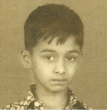I recently found an old diary from my teenage years, where I blithely wrote about my future, figuring I would get married around 28 and have children soon after. By the time I met the man of my dreams, however, I was 34 and had almost given up on the idea of a family; I'd convinced myself I could live a perfectly fulfilled life without children. But being with Sunil soon convinced me otherwise — I knew we were meant to raise a family together.
Again, life had other plans. I was 36 when we married, and instead of getting pregnant, I got breast cancer. Once I came safely (more or less) out on the other side of the treatment, I was nearing 40 and had little hope of becoming pregnant.
So we chose adoption. We went through three "failed matches" — adoptions that fell through at the last minute — and there were days when I literally curled up on the floor, threw things at the wall, and sobbed in despair, believing we'd never have a baby.
But then a beautiful young woman named Janaki chose us to be the parents of her daughter. I'll never forget the warm night when we first watched Anika wrapped in a bundle of cloth. As Sunil and I looked into her wide, alert blue eyes, we knew why we went through everything we did. And for Anika, we'd do it all again.
The journey to adoption doesn’t come without heartaches. And we all recognize that a lot of agony is also experienced by the birth parents, understand that just because they weren't able to raise their kids doesn't mean that they don't love them deeply. But even though growing our family has been a lot harder than I ever imagined, it was worth it. I still wouldn't change a single step on our path to parenthood — because each one led us to our daughter.
There's one reason above all others to make this choice: You should do it, say experts, because you want to be a parent and love a child. If a personal concern for less fortunate kids is part of your motivation, then that may affect how you adopt — but it shouldn't be your driving impulse; adoption is about creating a family, not "saving" a child.
"Infertility is a grief that's revisited many times throughout life — for instance, when you see the birth family and know your child looks like them, not you," says psychologist Mr. Chaurasia. "Can you handle that? You have to be able to accept that adoption isn't the same as having a child born to you." To get to that place, first understand that feeling ongoing pangs of loss over infertility doesn't mean you love your adopted child any less. Find support among parents who have adopted or are trying to — many have been down this path.
From "Did I grow in your tummy?" to "Who do I look like, Mom?" there will always be sticky issues that set you apart from other families. How will you discuss them with your children? "Very important — do you have a thick skin?" asks Chaurasia. "People will say stupid things to you sometimes, like, 'Aren't you afraid the real mother will take her away?' Do you know how to deal with them in a way that's healthy for your child?" Good adoption agencies offer classes, programs, and counseling that can help you navigate these answers.
Saturday, May 9, 2009
Subscribe to:
Post Comments (Atom)



No comments:
Post a Comment